Tales Of Self-Reliance: USHA Silai School And Corporate Partnerships Are Empowering Women
The USHA Silai School aims at taking the women's journey beyond being upskilled and independent. The focus is to induce an entrepreneurship culture among women in rural areas. USHA is working towards enabling and empowering women through partnerships with corporates like Aavas Foundation, a not-for-profit organisation and Balrampur Chini Mills Limited (BCML).
-
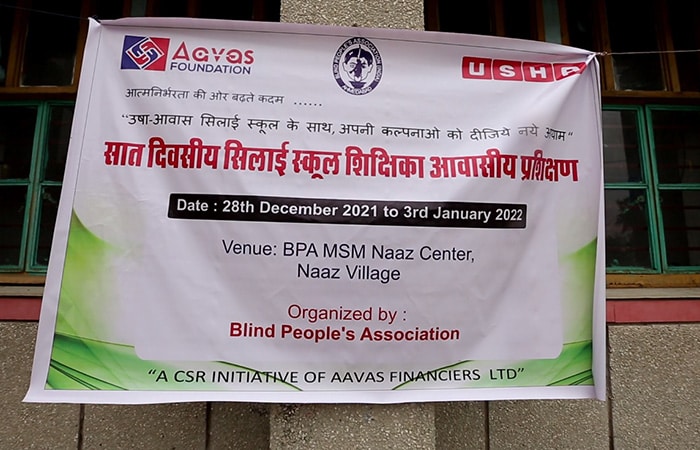 A very crucial initiative to make women stand on their own feet. They may be disabled or physically weak, but they all have the same, single-minded dream of being self-sufficient, of looking after their families. The USHA along with the Aavas Foundation started ‘Aavas Silai School' to skill rural women of Rajasthan, Gujarat and Maharashtra on sewing and stitching skills and provide them a sustainable and alternate source of livelihood.
A very crucial initiative to make women stand on their own feet. They may be disabled or physically weak, but they all have the same, single-minded dream of being self-sufficient, of looking after their families. The USHA along with the Aavas Foundation started ‘Aavas Silai School' to skill rural women of Rajasthan, Gujarat and Maharashtra on sewing and stitching skills and provide them a sustainable and alternate source of livelihood. -
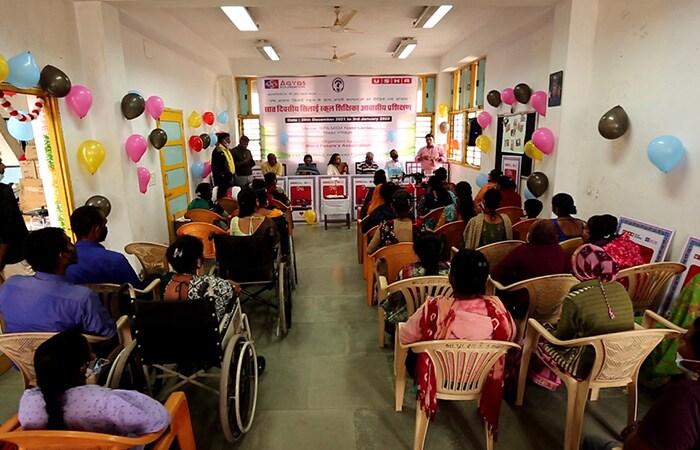 In Rajasthan, 150 women were trained during the COVID-19 pandemic. Today, these women earn Rs. 3,000 - Rs. 5,000 and support their families. The collaboration is well exemplified in Gujarat where 100 USHA Silai Schools will be set up this year with 100 specially-abled women. Of this, 25 women have been provided a seven-day training already.
In Rajasthan, 150 women were trained during the COVID-19 pandemic. Today, these women earn Rs. 3,000 - Rs. 5,000 and support their families. The collaboration is well exemplified in Gujarat where 100 USHA Silai Schools will be set up this year with 100 specially-abled women. Of this, 25 women have been provided a seven-day training already. -
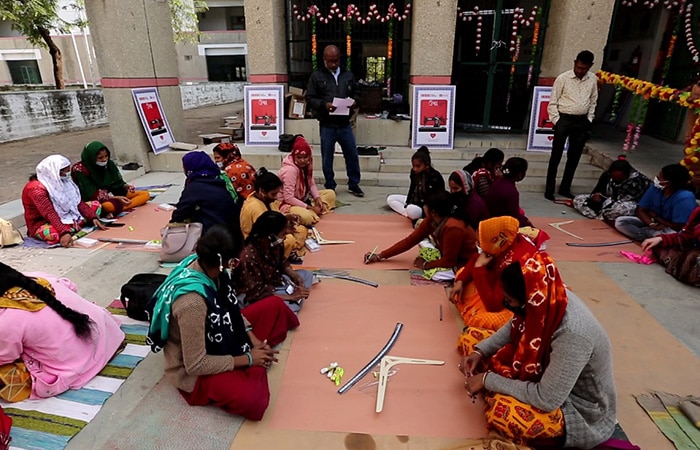 The process is not just limited to training. Once a relationship has been formed with the women, it stays for life, as does the support they are given. Whenever any woman faces any difficulty in sewing and stitching, a technical team from USHA reaches them within 24 hours to answer all their queries and clear doubts. USHA has also launched a mobile app to help women solve their problems and reach out to the USHA team through written and audio messages.
The process is not just limited to training. Once a relationship has been formed with the women, it stays for life, as does the support they are given. Whenever any woman faces any difficulty in sewing and stitching, a technical team from USHA reaches them within 24 hours to answer all their queries and clear doubts. USHA has also launched a mobile app to help women solve their problems and reach out to the USHA team through written and audio messages. -
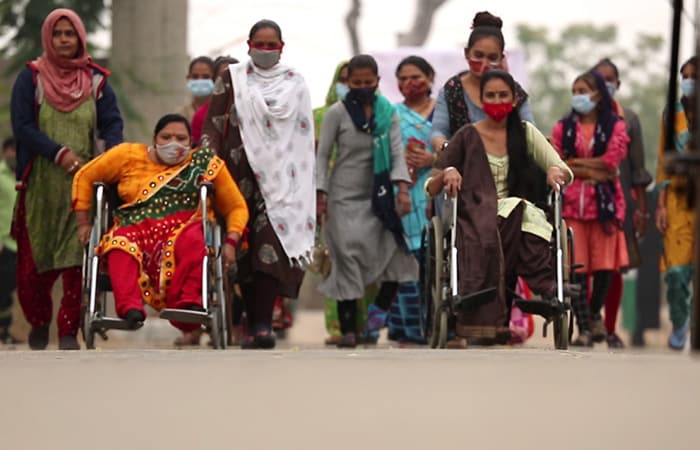 One such beneficiary is 34-year-old Desai Chetna Ben from Singharwa village in Gujarat. Desai Ben lives with her family of five - parents, two brothers and a sister-in-law. Desai Ben can't walk by herself since childhood; she has always been fond of doing embroidery. She wanted to be financially independent and USHA Aavas Silai School gave her the wings.
One such beneficiary is 34-year-old Desai Chetna Ben from Singharwa village in Gujarat. Desai Ben lives with her family of five - parents, two brothers and a sister-in-law. Desai Ben can't walk by herself since childhood; she has always been fond of doing embroidery. She wanted to be financially independent and USHA Aavas Silai School gave her the wings. -
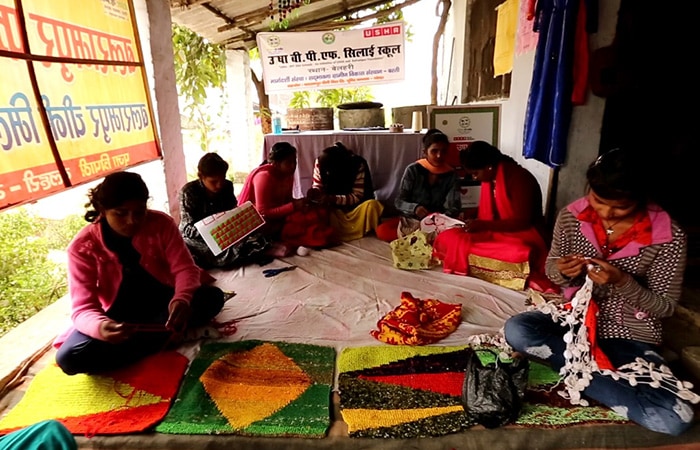 A new effort to combat the decades-old backwardness of the Babhnan, on the border of Gonda and Basti, in Uttar Pradesh. The effort is being led by the Babhnan Chini Mill, or sugar mill, and the USHA Silai School program. This initiative has created a new sense of hope and happiness in the area. The 35 selected women have been trained by the USHA Silai School, giving them a source of livelihood for themselves, and the chance to train other women too.
A new effort to combat the decades-old backwardness of the Babhnan, on the border of Gonda and Basti, in Uttar Pradesh. The effort is being led by the Babhnan Chini Mill, or sugar mill, and the USHA Silai School program. This initiative has created a new sense of hope and happiness in the area. The 35 selected women have been trained by the USHA Silai School, giving them a source of livelihood for themselves, and the chance to train other women too. -
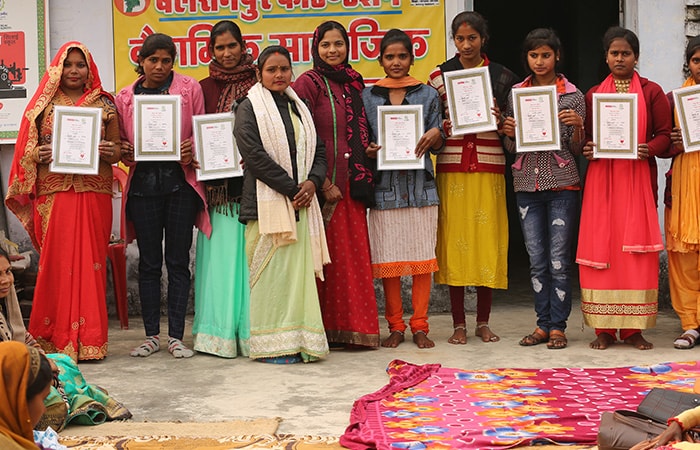 Women were sent to training schools in remote areas where arrangements were made for their stay and meals as well. Women were trained for a week following which their progress was continuously monitored for a year. Today, these women have become self-sufficient and self-reliant. They earn Rs. 8,000 to Rs. 10,000 per month and teach other women.
Women were sent to training schools in remote areas where arrangements were made for their stay and meals as well. Women were trained for a week following which their progress was continuously monitored for a year. Today, these women have become self-sufficient and self-reliant. They earn Rs. 8,000 to Rs. 10,000 per month and teach other women. -
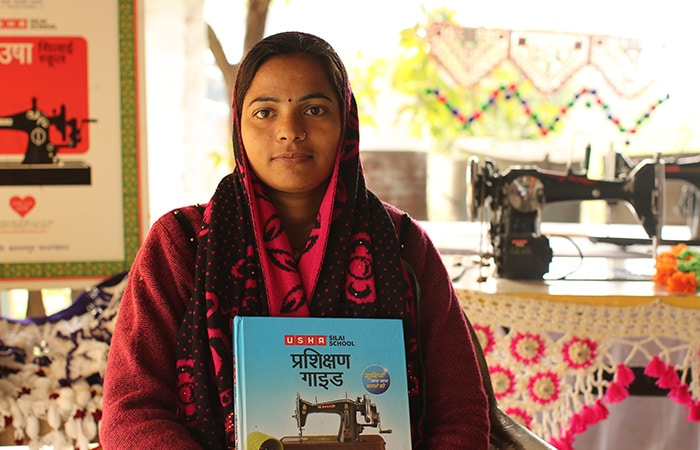 Pooja lives in a village a short distance away from the Balarampur sugar mill. She wanted to obtain a B.Ed. degree, but was married off instead, Pooja did not have the time but she definitely had the passion to do something. And it is that passion that brought her to the USHA Silai School. But it wasn't an easy journey.
Pooja lives in a village a short distance away from the Balarampur sugar mill. She wanted to obtain a B.Ed. degree, but was married off instead, Pooja did not have the time but she definitely had the passion to do something. And it is that passion that brought her to the USHA Silai School. But it wasn't an easy journey. -
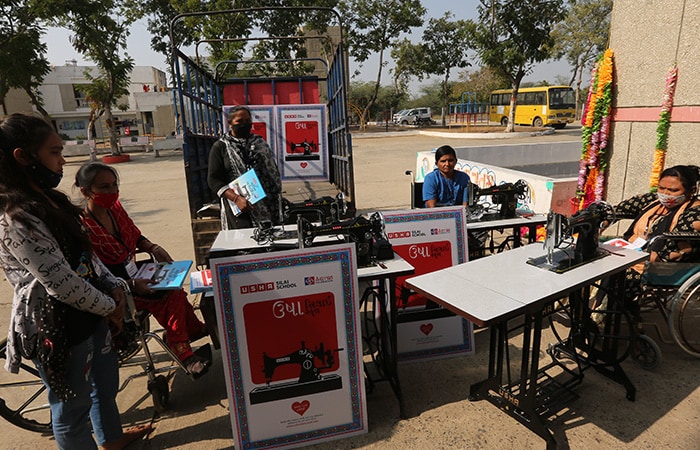 Pooja had learned stitching in the past and would often use that skill to train other girls. When she was made aware of a residential training camp in Babhnan, she showed interest in joining and received support only from her husband. With his encouragement and support, Pooja completed her training and, armed with a new USHA machine, started the first USHA Silai School in the area. But destiny had something else in store for her. She lost the one person who had supported her every step of the way - her husband. It was her husband's memories that gave her strength.
Pooja had learned stitching in the past and would often use that skill to train other girls. When she was made aware of a residential training camp in Babhnan, she showed interest in joining and received support only from her husband. With his encouragement and support, Pooja completed her training and, armed with a new USHA machine, started the first USHA Silai School in the area. But destiny had something else in store for her. She lost the one person who had supported her every step of the way - her husband. It was her husband's memories that gave her strength. -
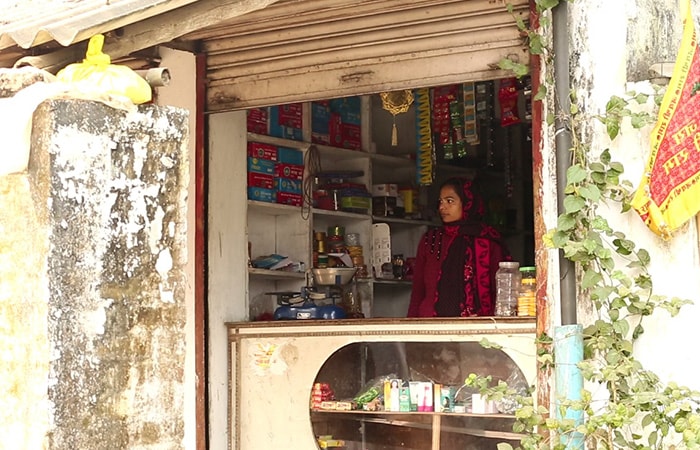 Pooja wakes up at 5 in the morning, does all the household chores, prepares the food and sends her child to school. From 10 in the morning to 5 in the evening, she runs her Silai School and the shop. In this fashion, till 11 pm, she manages her child, elderly father-in-law, the Silai School, the cosmetics shop and also her beauty parlour. Pooja's story is an example for other girls and a lesson to not give up.
Pooja wakes up at 5 in the morning, does all the household chores, prepares the food and sends her child to school. From 10 in the morning to 5 in the evening, she runs her Silai School and the shop. In this fashion, till 11 pm, she manages her child, elderly father-in-law, the Silai School, the cosmetics shop and also her beauty parlour. Pooja's story is an example for other girls and a lesson to not give up. -
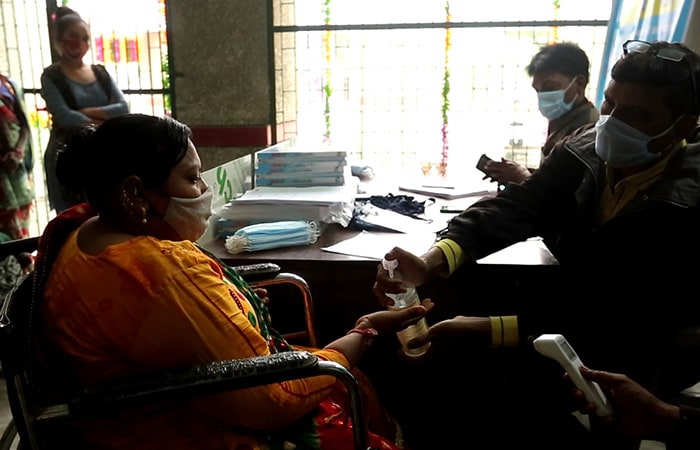 It's because of Pooja's dedication that over 50 girls from the areas around her village have trained in sewing and stitching, and are now walking the path of self-reliance. This success of the USHA Silai School programme has also encouraged the people at the Babhnan sugar mill to consider further collaborations in future projects.
It's because of Pooja's dedication that over 50 girls from the areas around her village have trained in sewing and stitching, and are now walking the path of self-reliance. This success of the USHA Silai School programme has also encouraged the people at the Babhnan sugar mill to consider further collaborations in future projects.
Advertisement
Advertisement
Advertisement
Advertisement
